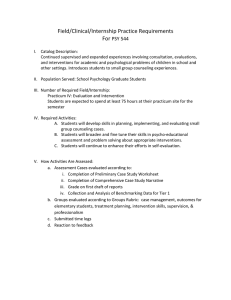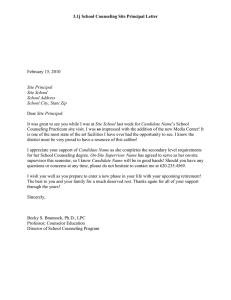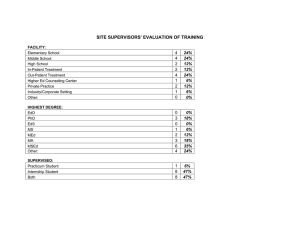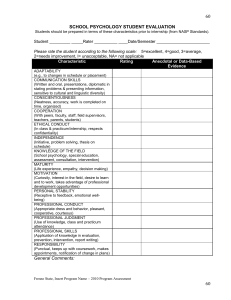Standard 3 Exhibit 7 School Counseling Program
advertisement
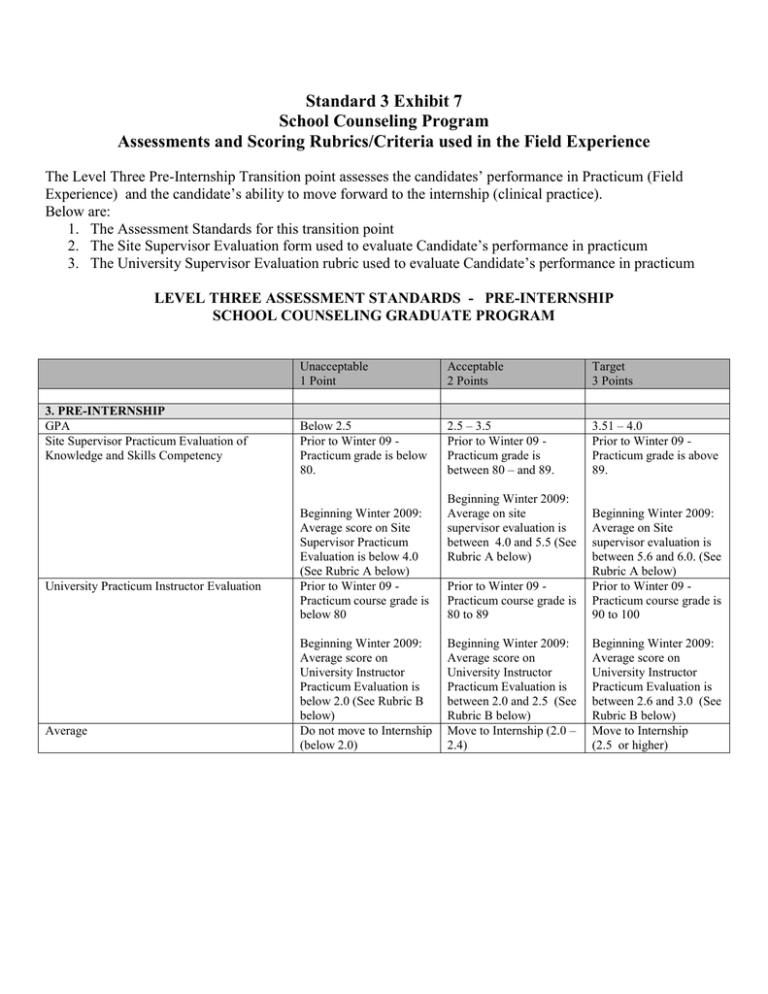
Standard 3 Exhibit 7 School Counseling Program Assessments and Scoring Rubrics/Criteria used in the Field Experience The Level Three Pre-Internship Transition point assesses the candidates’ performance in Practicum (Field Experience) and the candidate’s ability to move forward to the internship (clinical practice). Below are: 1. The Assessment Standards for this transition point 2. The Site Supervisor Evaluation form used to evaluate Candidate’s performance in practicum 3. The University Supervisor Evaluation rubric used to evaluate Candidate’s performance in practicum LEVEL THREE ASSESSMENT STANDARDS - PRE-INTERNSHIP SCHOOL COUNSELING GRADUATE PROGRAM 3. PRE-INTERNSHIP GPA Site Supervisor Practicum Evaluation of Knowledge and Skills Competency University Practicum Instructor Evaluation Average Unacceptable 1 Point Acceptable 2 Points Target 3 Points Below 2.5 Prior to Winter 09 Practicum grade is below 80. 2.5 – 3.5 Prior to Winter 09 Practicum grade is between 80 – and 89. 3.51 – 4.0 Prior to Winter 09 Practicum grade is above 89. Beginning Winter 2009: Average score on Site Supervisor Practicum Evaluation is below 4.0 (See Rubric A below) Prior to Winter 09 Practicum course grade is below 80 Beginning Winter 2009: Average score on University Instructor Practicum Evaluation is below 2.0 (See Rubric B below) Do not move to Internship (below 2.0) Beginning Winter 2009: Average on site supervisor evaluation is between 4.0 and 5.5 (See Rubric A below) Prior to Winter 09 Practicum course grade is 80 to 89 Beginning Winter 2009: Average on Site supervisor evaluation is between 5.6 and 6.0. (See Rubric A below) Prior to Winter 09 Practicum course grade is 90 to 100 Beginning Winter 2009: Average score on University Instructor Practicum Evaluation is between 2.0 and 2.5 (See Rubric B below) Move to Internship (2.0 – 2.4) Beginning Winter 2009: Average score on University Instructor Practicum Evaluation is between 2.6 and 3.0 (See Rubric B below) Move to Internship (2.5 or higher) Practicum Site-Supervisor Evaluation of School Counseling Candidates Competency Assessment Levels: 1. Unsatisfactory – Candidate has not shown initiative in developing this skill. 2. Novice / Beginning – Candidate is in the initial stages of development and has demonstrated beginning knowledge/skill under supervision. 3. Progressing – Candidate is developing this skill, and is beginning work in this area independently, as well as with supervision. Candidate is beginning to show initiative in developing this skill further. 4. Competent - Candidate understands and has used the skill. Works Independently and shows initiative in this area. 5. Proficient – Candidate has attained mastery of the skill and independently performs the skill. Candidate shows initiative and is ready for employment in the field of school counseling. I am willing to verify this skill when writing a letter of recommendation. 6. Exceptional – Candidate demonstrates skill levels and initiative above and beyond expectation. 7. Not Applicable, Not Observed, or No Opportunity, as yet Evaluation Item A. Counseling and Coordination 1. Understands referral process for counseling in the school. 2. Demonstrates understanding of a standard procedural counseling process (e.g. establishing the helping relationship, explaining confidentiality and other informed consent issues). 3. Understands record-keeping procedures and referrals for off-site services. 4. Understands procedure for coordinating and consulting with community referral sources. 5. Responds appropriately in a crisis. 6. Uses appropriate guidance techniques in the classroom. 7. Skillfully facilitates small and/or large groups. 8. Practices according to professional and ethical standards B. Collaborating and Consulting 1. Communicates effectively with co-workers. 2. Works effectively with faculty and staff to address student behavior and learning needs. 3. Is able to discuss the counselor's role as a consultant when serving on school intervention teams. C. Program Administration/Assessment and Use of Data 1. Is able to discuss how guidance programs are integrated with the school curriculum and overall mission. 2. Is able to discuss methods for determining school wide needs to be addressed by classroom guidance or small group curricula. 3. Is able to discuss procedures for planning and initiating additions to the guidance program such as classroom guidance or group curricula. 4. Is able to discuss how data is collected and compiled (e.g., grades, enrollment, attendance, retention, disciplinary actions, and placement) at school site. D. Leadership & Advocacy 1. Is able to discuss ideas about the counselor’s role in developing and implementing school-wide Competency Level programs that enhance student success in school. 2. Has a positive impact on student learning or academic achievement within the school 3. Is able to discuss ideas about utilizing outcome data to advocate for program viability. 4. Demonstrates the disposition that all children can learn. 5. Treats all children with fairness and concern E. Professionalism 1. Knows when to consult with supervisor for assistance and feedback. 2. Accepts feedback and recognizes constructive criticism. 3. Demonstrates appropriate organizational and time management skills. 4. Demonstrates appropriate oral and written communications skills. 5. Self presentation is consistently professional regarding manner of attire and interpersonal interactions. 6. Is prepared for scheduled activities and shares prepared materials with the site-supervisor. 7. Is always on time and treats the clinical experience as a job. AVERAGE SCORE FOR ALL SECTIONS Additional Comments: Rubric for Practicum University Instructor Evaluation of School Counseling Candidates Standard Unacceptable 1-point through assignments and time in the school, candidate DID NOT have a positive impact on student learning and the school Acceptable 2-points through assignments and time in the school, candidate DID have a positive impact on student learning and the school Candidate Growth Candidate DID NOT grow professionally at the expected level; or did not incorporate feedback, or did not act in a responsible manner during the semester Candidate DID grow professionally at the expected level; and DID incorporate feedback, and DID act in a responsible manner during the semester Class Work Was NOT organized, or class assignments were of poor quality, or did NOT participate consistently in class, or was tardy or absent consistently Was organized, and class assignments were of good quality, and participated consistently in class, and was not tardy or absent Readiness for Internship Candidate is not ready for internship Average Score Below 2.0 Do not move on to internship Candidate is ready for internship and has demonstrated the expected level of counseling skills 2.0 to 2.5 Move to internship Candidate has a positive impact on learning and the school. Target 3-points through assignments and time in the school, candidate DID have a positive impact on student learning and the school; and the candidate collected data and shared data with supervisors and other candidates documenting this positive impact Candidate DID grow professionally at an exceptional level; and DID incorporate feedback, and DID act in a responsible manner during the semester; overall growth was exceptional – in the top 5% of candidates Was organized, and class assignments were of excellent quality, and participated consistently in class, and took a leadership role in class, and was not tardy or absent Candidate is ready for internship and has exhibited exceptional counseling and leadership skills 2.6 to 3.0 Move to internship
